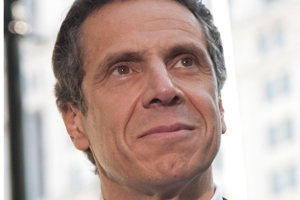Last week, New York Gov. Andrew Cuomo announced his support of a change to state law that would decriminalize the possession of small amounts of marijuana in public view.
 Gov. Cuomo made his announcement at a news conference last week at the state capitol in Albany . Also supporting the legislative change was New York City Mayor Michael Bloomberg, New York Police Department Commissioner Ray Kelly and New York City Council Speaker Christine Quinn, who said she has plans to pass a resolution denouncing “unlawful” marijuana arrests. Currently, the state’s legislative session is scheduled to conclude on June 21.
Gov. Cuomo made his announcement at a news conference last week at the state capitol in Albany . Also supporting the legislative change was New York City Mayor Michael Bloomberg, New York Police Department Commissioner Ray Kelly and New York City Council Speaker Christine Quinn, who said she has plans to pass a resolution denouncing “unlawful” marijuana arrests. Currently, the state’s legislative session is scheduled to conclude on June 21.
Last year, New York City police made more than 50,000 arrests for low-level marijuana possession, ultimately accounting for one out of every seven arrests in the nation’s largest city in 2011.
According to recent estimates, marijuana possession arrests are believed to cost New York City an annual average of $75 million. While the proposed legislative changes would no longer make low-level marijuana possession an offense punishable by arrest, those found with small amounts of marijuana – under Cuomo’s proposal, 25 grams or less – would be fined upwards of $100 under the new law. Public marijuana smoking and possession of marijuana in public view, however, would remain misdemeanors under Cuomo’s proposal.
Over the last 10 years, New York City has totaled more than 400,000 low-level marijuana arrests, easily eclipsing the city’s low-level marijuana arrests stretching from the late 1970s until Bloomberg’s mayoral period began. Additionally, many advocates and activists cite the state’s current possession laws as racially biased, with approximately 86 percent of those arrested for low-level possession in New York City being people of color.
Donna Lieberman, executive director of the New York Civil Liberties Union, told The New York Times that the continual arrest of young people for low-level marijuana possession would result in major employment and educational difficulties for the state’s youth once they become adults.
“For individuals who have any kind of record, even a minuscule one, the obstacles are enormous,” she said. “When it’s really a huge number of kids in the community who go through this, and all have the same story, the impact is just devastating.”
Photo from Wiki Commons






























